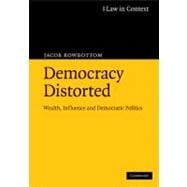
Note: Supplemental materials are not guaranteed with Rental or Used book purchases.
Purchase Benefits
Looking to rent a book? Rent Democracy Distorted: Wealth, Influence and Democratic Politics [ISBN: 9780521700177] for the semester, quarter, and short term or search our site for other textbooks by Jacob Rowbottom. Renting a textbook can save you up to 90% from the cost of buying.
| Preface and acknowledgements | p. ix |
| Political equality, wealth and democracy | p. 1 |
| Wealth and democratic politics | p. 2 |
| Political equality | p. 7 |
| Democratic models and political equality | p. 13 |
| Stages of the democratic process | p. 21 |
| Wealth as a source of influence | p. 24 |
| Egalitarian politics and policies | p. 30 |
| Conclusion | p. 31 |
| Freedom to speak and freedom to spend | p. 33 |
| Engaging freedom of expression | p. 36 |
| Positive obligations | p. 37 |
| Justifications for freedom of expression | p. 39 |
| The speaker's interest | p. 41 |
| Collective justifications for expression rights | p. 44 |
| Quantity, scarcity and competitive advantages | p. 52 |
| Listener autonomy | p. 57 |
| Electoral and political expression | p. 59 |
| Conclusion | p. 61 |
| Strategies and reforms | p. 62 |
| The risks of state intervention | p. 62 |
| Insulating the democratic processes | p. 66 |
| Conclusion | p. 76 |
| Access, influence and lobbying | p. 78 |
| Cash for favours, access and corruption | p. 80 |
| Lobbying | p. 87 |
| Lobbyists, Parliament and the executive | p. 94 |
| A participatory process | p. 102 |
| Strengthening transparency | p. 104 |
| Conclusion | p. 110 |
| Beyond equal votes: election campaigns and political parties | p. 112 |
| Background | p. 113 |
| Spending limits | p. 117 |
| Political donations | p. 121 |
| State funding | p. 128 |
| Making subsidies responsive | p. 131 |
| Responsiveness and other democratic goals | p. 135 |
| Institutional donations | p. 136 |
| Conclusion | p. 141 |
| Public spaces, property and participation | p. 143 |
| Public spaces and a shrinking subsidy | p. 144 |
| Access to state-owned property | p. 147 |
| Private management of publicly owned spaces | p. 151 |
| Public spaces and private land | p. 154 |
| Rights of access | p. 157 |
| The rights of the owner | p. 164 |
| Conclusion | p. 169 |
| The mass media: democratic dreams and private propagandists | p. 171 |
| The mass media and democracy | p. 173 |
| Inequalities in wealth and the mass media | p. 177 |
| Media ownership and concentration | p. 186 |
| Safeguarding editorial and journalistic autonomy | p. 194 |
| Subsidies | p. 196 |
| Rights of access | p. 201 |
| Impartiality | p. 208 |
| Media sectors and freedom of expression | p. 210 |
| Conclusion | p. 214 |
| Participation in the digital era: a new distribution? | p. 216 |
| Lobbying | p. 217 |
| Party funding | p. 219 |
| Political debate in the new media | p. 222 |
| Possible solutions | p. 240 |
| Conclusion | p. 243 |
| Conclusion | p. 245 |
| Index | p. 249 |
| Table of Contents provided by Ingram. All Rights Reserved. |
The New copy of this book will include any supplemental materials advertised. Please check the title of the book to determine if it should include any access cards, study guides, lab manuals, CDs, etc.
The Used, Rental and eBook copies of this book are not guaranteed to include any supplemental materials. Typically, only the book itself is included. This is true even if the title states it includes any access cards, study guides, lab manuals, CDs, etc.